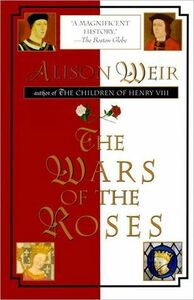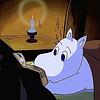Take a photo of a barcode or cover
Before reading this book I thought to myself "if I can keep track of all twelve thousand characters and plotlines in A Song of Ice and Fire, I can handle the War of the Roses." I was wrong. Though Alison Weir does an excellent job making such a horrifically complicated time in history mostly understandable. My one quibble is that so many different dudes are called the same thing (how many Somersets are there? And wait, Gloucester was Richard III all along?!? What is this?! Now is the winter of our discontent indeed). A fascinating read.
Also, Margaret of Anjou = Cersei Lannister. Just sayin'. Minus the thing with her brother, obviously.
Also, Margaret of Anjou = Cersei Lannister. Just sayin'. Minus the thing with her brother, obviously.
I mostly picked this one up to read in-between library holds, and also because I know any non-fiction by Weir is going to be good. And I was not disappointed! I enjoyed the first half more than the second - turns out the run-up to the Wars of the Roses was more interesting than the wars themselves. I love the insight Weir gives into the time period, and all the foreshadowing of later events that I am more familiar with. It was cool to come across, say, baby Henry VII and be all "oooooooh!"
As always, I thoroughly enjoyed Alison Weir's book. It was a little confusing to follow the huge cast of historical characters in this saga but Weir does her best to minimize the confusion, even including several family trees at the end of the book. She also manages to present a sweeping overview of the entire history of the Wars of the Roses without either getting too bogged down in details or omitting interesting little details from before, during, or after the wars. As with her other historical works, the tone is much more approachable than a more traditional history book. Immensely enjoyable!
this was so incredibly well written there weren't many times where I was confused as to who was who (although my creating of a complete family tree certainly helped and I would recommend doing it yourself if you want to read this book just so you can follow who's related to who because oh boy) and was thoroughly entertained all the way through! this book has cemented my love for the medieval time period and obsession with English monarch history. I strongly recommend reading this if you have any interest whatsoever in English history!! ill definitely be checking out Wier's other books after this.
I enjoyed this well enough, but I don't think it's the best choice right now. I'll try to come back someday.
The hardest part the war of the Rose's is that everyone is called Henry, Edward, George, or Richard. I really enjoyed Weir's 'The Six Wives Of Henry the 8th' and have always been confused by the War of the Rose's so thought I would give The Lancasters and Yorks a go. It was a bit of a hard slog, maybe because there was little actual fighting in the war or because it is so confusing working out whose side everyone is on. The book felt like it was more on the side of the Lancastrians than the Yorkist and I would have liked a bit more info on Edward and the Woodvilles. Still it was informative and I enjoyed my first Weir book so I will read more of her work in the future.
This book describes the war between the descendants of the younger sons of Edward III, commonly known as the War of Roses, all begun because Edward III’s heir was his 12 year old grandson.
This gem solidified Alison Weir's position as my favourite modern historian, I loved every single part of it!!!! What I loved most about it is that it was neither a simple fact-stating book nor an overly dramatised tale and it managed to bring the characters involved to life and make the reader sympathise with and relate to them - both Lancastrian and Yorkist - I had only a vague idea about the topic prior to reading this book and knew only the general outcome so it was amazing to be kept in suspense while reading. This also introduced me to a great number of impressive historical figures I never, or rarely, came across before, particularly Warwick and Margaret of Anjou. I can't wait to get my hands on "Richard III and the princes in the tower" and really hope that Weir will go forward with the book she mentioned in the interview at the end about the elimination of the last of the plantagenets in the Tudor era.
Compellingly written account of one of the most complex conflicts in European history. Emphasizes the personalities of the figures over reciting dry data in order to paint a picture of what life was like in this turbulent era of medieval history, especially among the magnates and royalty of England at the time.





